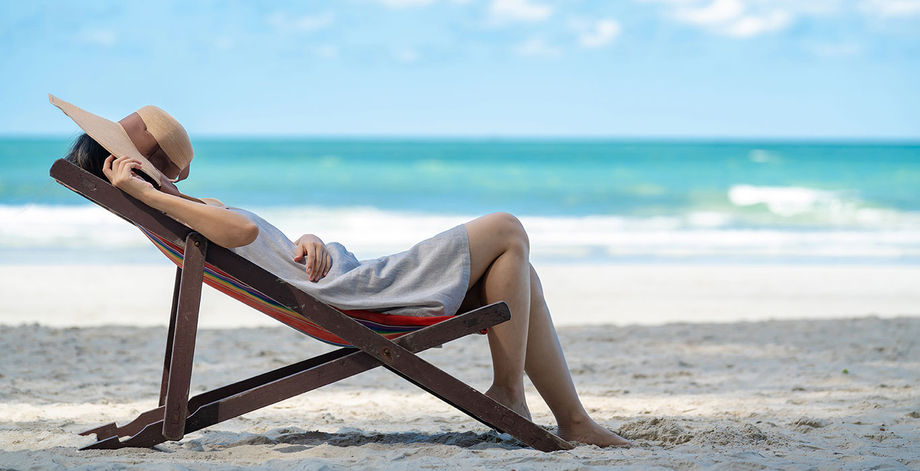 Photograph by CandyRetriever for Adobe Stock
Photograph by CandyRetriever for Adobe Stock
No longer content with jam-packed itineraries, travelers are prioritizing relaxation and sleep over sightseeing.
Research from Hilton shows a shift in travel psychology: Relaxation is no longer a perk of a vacation but its primary focus. Last year, travelers cited rest and recharge as their top motivators for travel, and Hilton just crowned sleep tourism one of its top travel trends for 2025.
"Ultimately, the biggest priority for a hotel guest is to get a great night's sleep — so it's no surprise that this current trend around sleep tourism and holistic wellness is having such an impact," said Dino Michael, senior vice president and global head of luxury brands at Hilton.
Sleep tourism by the numbers
The numbers tell a compelling story: Many global vacationers now unapologetically practices "hurkle-durkling," a charming Scottish term for intentionally lounging in bed all day. Younger generations lead the charge: 30 percent of Gen Zers love it, compared with 11 percent of Gen Xers and baby boomers.
The CDC indicates that nearly 37 percent of Americans aren't getting enough sleep, which coincides with a rise in stress levels. Nearly half of all Americans frequently experience significant stress, the highest Gallup figure to date.
Laura Montesanti, founder of Synergy — The Retreat Show, said, "Sleep challenges affect millions globally, and addressing the root causes is key to restoring rest. Holistic approaches like Ayurveda and breathwork retreats have long focused on unraveling the causes of insomnia and poor sleep, offering transformative benefits.
Young women are particularly affected, with 53 percent reporting frequent stress — 23 points higher than in 2007. This shows a concerning cycle: Insufficient sleep can lead to increased stress, and high stress can disrupt sleep, worsening both conditions.
Stella Photi, founder of Wellbeing Escapes, said, "The demand for dedicated sleep programs continues to grow as people are becoming more educated on the importance of good sleep and its impact on our overall wellbeing. Medical research shows that sleep largely influences cardiovascular health, metabolic health and weight management, cognitive function and mental health and that poor sleep may be linked to an increased risk of developing Alzheimer's disease and other forms of dementia."
Sleep retreats are becoming popular
Sleep has become the ultimate luxury, and travelers are willing to pay premium prices to experience it. Wellness-focused hotels are responding with specialized sleep packages, high-tech mattresses, circadian lighting and personalized relaxation experiences, offering a comprehensive reset for stressed travelers.
Montesanti noted, "With innovative retreats emerging, sleep is no longer just about rest — it's a tool for renewal and personal growth."
Big Sur's Post Ranch Inn in California has redefined luxury travel, turning sleep into an art form. The resort partnered with sleep expert Michael Breus, the Sleep Doctor, to craft a wellness experience that improves how guests sleep each night. The package includes a chef-curated Sleep Serenity Menu to promote restful sleep, sleep coaching, and specialized spa treatments for a holistic approach to bettering sleep.
"The Sleep Program at Post Ranch is an excellent and healthy way to kick off a new sleep regime for the well-rested to the troubled sleeper. I developed it as a painless way for people to get out of their old environment, with old sleep habits, and learn a skill that they can improve while on property and then use for the rest of their lives," Breus said.
Other properties are also taking note of this demand. In Champillon, France, the Royal Champagne Hotel and Spa's "Royal Sleep Experience" highlights French beauty brand Aime. The package includes melatonin-based products, an in-room meditation box, a satin face mask and linens, a candle massage, and a Sleeping Beauty Mocktail before bed.
The Nautilus Maldives takes the trend one step further with its Solasta Slumber Ritual. The resort offers a menu of "yoga nidra," or sleep yoga options, alongside massages, thermal baths, reflexology and more — all in the name of better sleep.
Create a sleep staycation
The rise of sleep tourism reflects a growing desire for rest in an overstimulated world. While not everyone can fly across the world on a sleep-tourism retreat, travelers can apply the principles of this trend to create a restful staycation.
Think of your bedroom as an upscale hotel. Upgrade your sheets, mattress, and pillow. If your home is noisy, soundproof your room using inexpensive acoustic panels. Hanging thick curtains over your windows also can help absorb sound.
Adjust your sleep schedule. Go to bed and wake up at the same time each day. Consider incorporating sleep resort-inspired activities, such as evening yoga, sound baths, masks, and facials. Additionally, free online resources, such as YouTube videos and meditation apps, offer accessible tools to enhance sleep quality. Bonus points if you can be screen-free during your at-home sleep retreat.
Be your own chef. Create a sleep-inducing menu. According to registered dietitian Whitney English, "Caffeine consumed even six hours before bed can make it difficult to fall asleep, as it blocks the hormone adenosine, which promotes sleepiness." She added that saturated fats, often found in red meat and ultra-processed foods, can lead to less slow-wave sleep, considered the most restorative form of sleep.
An overall healthy dietary pattern — a fiber-rich diet with beans, lentils, and fruits and vegetables — is associated with higher-quality sleep. English noted, "While there isn't one magic food or drink that will improve sleep, avoiding caffeine, alcohol and heavy meals in the few hours before bed can help."
You don't have to do all this for better sleep at home, but taking a break from your usual routine, and being mindful of stress and other contributors to poor sleep hygiene can help your staycation feel like a real escape.
This article was produced by Media Decision, syndicated by Wealth of Geeks and distributed by the Associated Press.